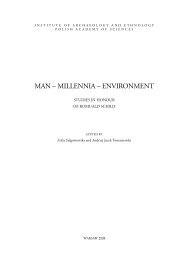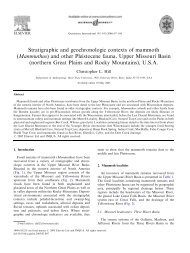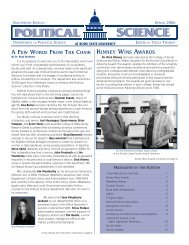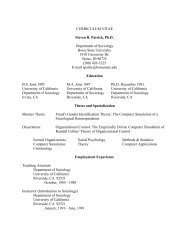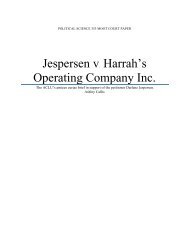From Incivility to Outrage - College of Social Sciences & Public ...
From Incivility to Outrage - College of Social Sciences & Public ...
From Incivility to Outrage - College of Social Sciences & Public ...
You also want an ePaper? Increase the reach of your titles
YUMPU automatically turns print PDFs into web optimized ePapers that Google loves.
Downloaded by [Boise State University] at 17:30 21 December 2011<br />
Political Discourse in Blogs, Talk Radio, and Cable News 41<br />
Conflagration<br />
Coding for this variable records attempts <strong>to</strong> escalate nonscandals in<strong>to</strong> scandals. The key<br />
trait is speech that overstates or dramatizes the importance or implications <strong>of</strong> minor gaffes,<br />
oversights, or improprieties. By nonscandal we refer <strong>to</strong> an episode, event, or trend that a<br />
learned, dispassionate observer would not consider significant or scandalous.<br />
Ideologically Extremizing Language<br />
The reference here is <strong>to</strong> extremist language used <strong>to</strong> critically describe a person, group <strong>of</strong><br />
people, branch <strong>of</strong> the government, political party, or other organization or their behaviors,<br />
planned behaviors, policies, or views. Usually the descriptive language will be used as an<br />
implicit slur rather than as simple description.<br />
Slippery Slope<br />
This is intended <strong>to</strong> capture fatalistic arguments suggesting that some behavior, policy, or<br />
decision is a small step that will inevitably pave the way for much more extreme behaviors,<br />
policies, or decisions.<br />
Belittling<br />
When an author or speaker belittles or demeans a person, group <strong>of</strong> people, branch <strong>of</strong> the<br />
government, political party, or other organization (or their behaviors, planned behaviors,<br />
policies, or views), this is labeled “belittling.” This may be done in the context <strong>of</strong> mockery<br />
or exaggeration.<br />
Obscene Language<br />
This gauges use <strong>of</strong> obscene language in reference <strong>to</strong> a person, group <strong>of</strong> people, branch <strong>of</strong><br />
the government, political party, or other organization (or their behaviors, planned behaviors,<br />
policies, or views). Here we mean words that are not used on network television (as<br />
a general rule), not simply insulting words. If the obscene language is used concretely <strong>to</strong><br />
name-call, this falls under the “name-calling” category.



